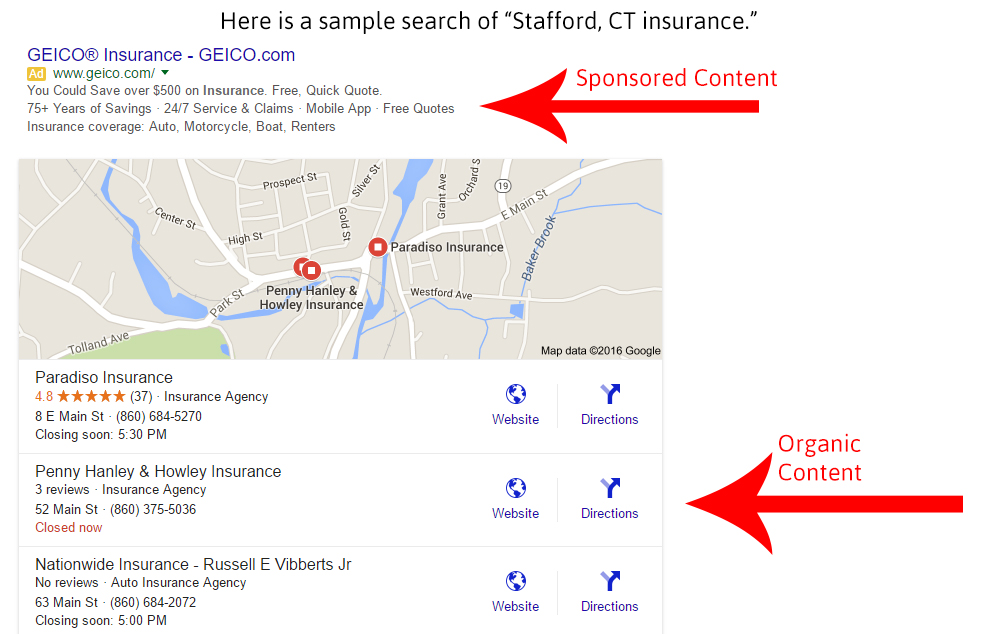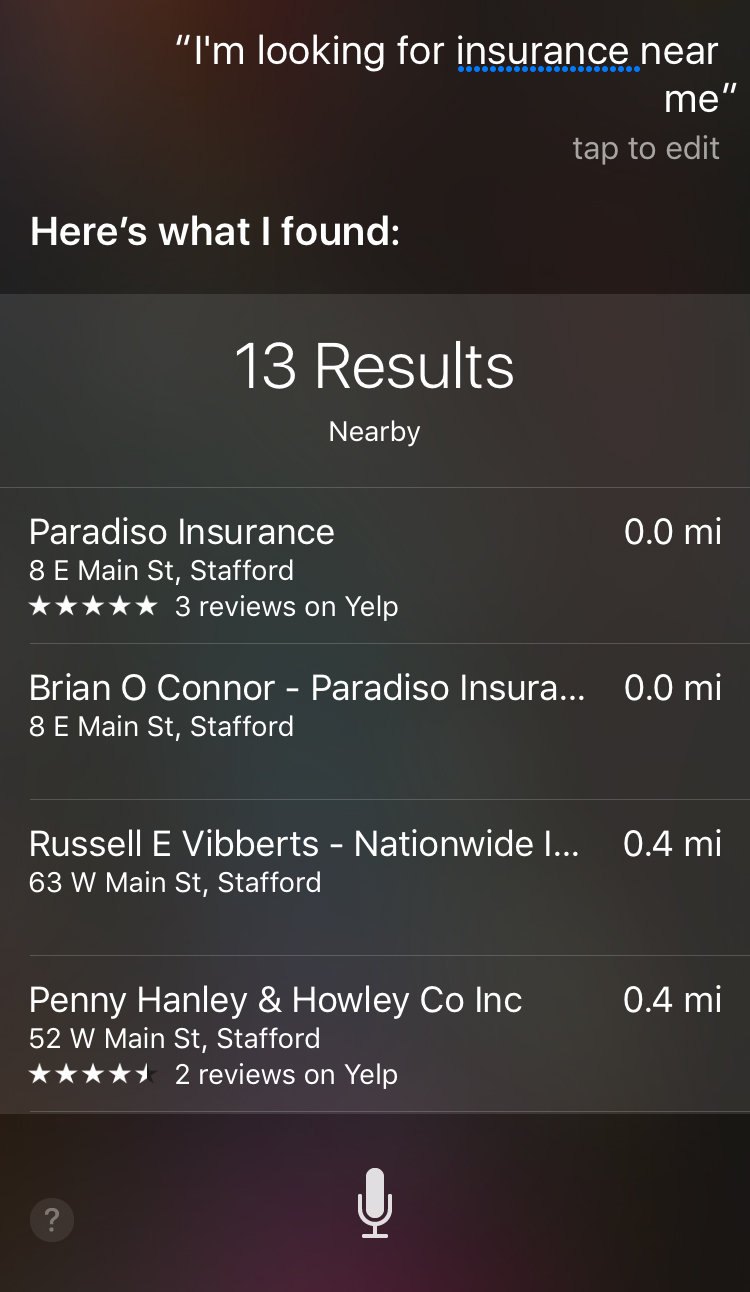I’ve said it before and I’m sure I’ll say it until I’m blue in the face, SEO should be a crucial focus to any independent insurance agency’s digital strategy. For those of you asking what exactly SEO stands for, it’s also known as Search Engine Optimization, or any efforts you take to beat out the competition in ranking highly on search results online. That means, when a customer, client, or even prospect searches for your insurance agency’s product or services on their favorite search engine (most likely Google), your goal will be to hold the number one spot in the search results rankings so they choose your agency over your competition, and it’s up to you to optimize your agency digitally so we can sit on top.

Of course, you will see some sponsored content labeled as an “ad” before you see the organic search results. We don’t want to focus on being sponsored on Google, because 9 times out of 10 those ads are glanced over, and people look to the organic results. We want to be at the top of the organic results, but Google is updating their search engine algorithms every 18 hours to assure their clients get the best possible answers for their searches. They want the everyday user to find exactly what they are looking for in just one search, instead of multiple, so they are always improving their user experience by optimizing their algorithms. In turn, we need to optimize as well, so let’s take a look at some best SEO practices in today’s fast-pace moving world of 2016.
Keywords are Still Essential
Yes, keywords are still essential, and no, we cannot cheat the system. Back in 2010 and earlier, website designers would sometimes hide keywords in the background of their websites and disguise them with the same color font as the color of the background, or even try to put keywords in a microscopic font around their website to increase their website’s traction. Well, those days are long gone, because Google knows now who is cheating and who’s really authentic. Keywords have evolved over time, because now there are words associated with keywords as well, such as synonyms that we would refer to as proof terms, and secondary synonyms that we could refer to as relevant term. For example, if we had a focus keyword of “auto insurance” for a blog we wrote for our insurance agency, we could have some proof terms that we also use frequently that would be related to our keyword, such as “commercial auto insurance,” or “personal car insurance,” and so on. From there, we could have some relevant terms associated with our proof terms, such as “teen driving,” “truck drivers insurance,” “classic car insurance,” and so on.
Google will know whether or not we are appropriately making use of keywords, proof terms, and relevant terms, which will directly affect our results. Keywords are also important for our writing fundamentals as a whole though, and help keep our writing on focused on what our users are searching for. It’s a simple fact, if you’ve got a clear understanding about keywords and the direction you’re writing is headed in, you will have an edge.
Upping the Ante
 As I mentioned earlier, we live in a fast-paced world, and that comes with rapid consumer demand. Expectations of the everyday consumer are constantly being raised, and Google’s performance is no exception to that matter. Now we have to focus on appealing to how people are searching, not just what they are searching for. More often than not, searches are being conducted by users on smartphones or mobile, and often times, they will use “voice to text” as their search method. This means they speak what they are looking for into their phone instead of typing it, and believe me, it impacts their search, and your focus. Now, people are using searches that are more conversational, so it’s important that we think about conversational searches when we are giving our writing a touch of SEO. A user may have used to search for “Stafford, CT insurance” when searching for my agency personally, but now, they may just ask google to find “insurance near me.” These are things you want to keep in mind for optimizing your agency in the local market.
As I mentioned earlier, we live in a fast-paced world, and that comes with rapid consumer demand. Expectations of the everyday consumer are constantly being raised, and Google’s performance is no exception to that matter. Now we have to focus on appealing to how people are searching, not just what they are searching for. More often than not, searches are being conducted by users on smartphones or mobile, and often times, they will use “voice to text” as their search method. This means they speak what they are looking for into their phone instead of typing it, and believe me, it impacts their search, and your focus. Now, people are using searches that are more conversational, so it’s important that we think about conversational searches when we are giving our writing a touch of SEO. A user may have used to search for “Stafford, CT insurance” when searching for my agency personally, but now, they may just ask google to find “insurance near me.” These are things you want to keep in mind for optimizing your agency in the local market.
Additionally, I’d like to mention a few tips for using your keywords. Although keywords are highly important, it’s important that your writing flows naturally, because keyword stuffing simply doesn’t work. Well-written content is king to any other forms of writing, and you have to use keywords when you have an opportunity to instead of constantly trying to force opportunities to get your keywords out. Users want the best possible experience online, and Google wants to provide that experience for them. If Google thinks your writing was forced, then it won’t want to show your content to its users. This is also why it’s important that your website has a great user experience as well, because if users are constantly bouncing off, Google will stop sending them there. Remember, a great user experience will encourage interaction on your website, and Google loves to see their users engaging with websites once they arrive. The more you get your audience talking, the better.
Overall, you have to be real when it comes to the digital world. You can’t take shortcuts, and you have to stay focused with proper keyword usage, and constantly stay authentic and true when it comes to interacting with your audience online or producing content. If you have any additional best practices to add, we’d love to hear about them in the comments section below. As always agents and brokers, happy marketing!





